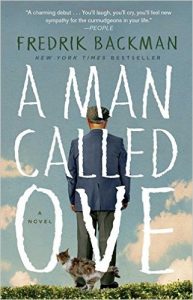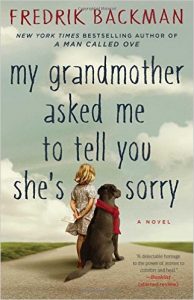A MAN CALLED FREDRIK BACKMAN
Novels that pack a punch but still leave the reader feeling uplifted don’t come along very often. Too frequently, novels tend to depict the world we live in as dangerous and dreary or they’re filled with unflappable optimists and do-gooders. Swedish author Fredrik Backman walks the line between those two scenarios perfectly in his first two novels, A Man Called Ove and My Grandmother Asked Me To Tell You She’s Sorry.
don’t come along very often. Too frequently, novels tend to depict the world we live in as dangerous and dreary or they’re filled with unflappable optimists and do-gooders. Swedish author Fredrik Backman walks the line between those two scenarios perfectly in his first two novels, A Man Called Ove and My Grandmother Asked Me To Tell You She’s Sorry.
I read A Man Called Ove first and loved its main character, a grouchy old man who’s set in his ways and seems to have no tolerance for anyone who can’t understand that his way is not just the right way; it’s the only way.
In the residential development where he lives, Ove walks around the neighborhood every day to make sure all the parking rules are being followed. He finds his neighbors exasperating for any number of reasons—they don’t have a driver’s license, for example, or if they do, they insist on driving cars other than Saabs (the brand he prefers)—and it’s obvious his neighbors find him just as exasperating.
The only person who understands him is his wife, and when she dies, he’s so lost, he makes several attempts at suicide. Fortunately for him, something always goes wrong with his plans.
Backman constructs a world of experiences for Ove, including the loss of an unborn child, that could carve sharp edges on any person. And then he shows the reader into Ove’s tortured soul, just as some of his neighbors begin to break through his prickly exterior. The result is both humorous and touching, while still maintaining the story’s edge.
 In My Grandmother Asked Me To Tell You She’s Sorry, Backman works in the other direction. He starts in a good place and then spreads his focus to embrace the not-so-good. Told from the point of view of a seven-year-old girl, the story opens with the special relationship between the girl, Elsa, and her granny. Granny is a retired surgeon who has worked in needy areas around the world but now lives in an apartment next to the one where Elsa and her mother live. Elsa thinks Granny is a bit crazy because she leads Elsa on daring escapades, mostly in the name of saving a kingdom that is part of an elaborate fairy tale that Granny made up, or so Elsa thinks. Granny and Elsa have a secret language, which is the language spoken in the kingdom.
In My Grandmother Asked Me To Tell You She’s Sorry, Backman works in the other direction. He starts in a good place and then spreads his focus to embrace the not-so-good. Told from the point of view of a seven-year-old girl, the story opens with the special relationship between the girl, Elsa, and her granny. Granny is a retired surgeon who has worked in needy areas around the world but now lives in an apartment next to the one where Elsa and her mother live. Elsa thinks Granny is a bit crazy because she leads Elsa on daring escapades, mostly in the name of saving a kingdom that is part of an elaborate fairy tale that Granny made up, or so Elsa thinks. Granny and Elsa have a secret language, which is the language spoken in the kingdom.
Life is good for Elsa, or as good as it can be for a seven-year-old who doesn’t fit in at school and is often chased by bullies. Granny explains to her that the greatest danger in the kingdom is that the shadows will bite people and cause them to lose their imagination, which is a fate worse than death. After that there will no longer be anything left that is different. “Only different people change the world,” Granny says.
And so Elsa is content until she discovers that Granny is sick and will soon die. On the day before she dies, Granny gives Elsa a letter addressed to one of the tenants in their apartment building, a tenant whom Elsa has always referred to as “The Monster” because everyone is afraid of him. Elsa doesn’t want to deliver the letter, but Granny says it will start her on a magnificent treasure hunt. “It’s going to be a grand adventure and a fairy tale of marvels,” she says. “But it’s my fault that you’ll find a dragon at the end, my darling knight.”
And thus the adventure that is the spine of the novel’s plot begins. When she attempts to deliver the letter, Elsa is stunned to hear The Monster speak in Granny and Elsa’s secret language. Angry with Granny for sharing the language with someone else, she forces herself to talk to The Monster and soon realizes he is Wolfheart from Granny’s fairy tales.
The next clue in the treasure hunt is another letter Elsa finds in Granny’s Renault. This one is addressed to a woman who also lives in the building, a woman Elsa thinks of as “The Drunk.”
Letter by letter, delivery by delivery, Elsa moves deeper into the world of the tenants, a world that bears a striking resemblance to Granny’s fairy tales. And in each letter Granny apologizes to the recipient for some incident in the past, revealing shared experiences involving war, death, post-traumatic stress disorder, natural disaster, and other tragedies.
The genius of My Grandmother Asked Me To Tell You She’s Sorry is the juxtaposition of the imaginary world and reality. Backman deals with very harsh subjects, but by seeing them from a child’s point of view, and by describing them first as events that take place in a magical kingdom, he’s able to explore their meaning in a way that shows them as only part of the overall experience of life. The six kingdoms of Granny’s fairy tale world are named “I love,” “I mourn,” “I dream,” “I dare,” “I dance,” and “I fight,” but “I fight” has been destroyed, and Wolfheart is its only survivor.
The world of Fredrik Backman is obviously real with all of its danger and sadness firmly in place, but it also has another dimension that makes life worth living. His characters have a fullness of heart that shows they manage to live in more than one dimension, although not completely. They struggle to master the dimensions, just as we all do.
Sally Whitney
Sally Whitney is the author of When Enemies Offend Thee and Surface and Shadow, available now from Pen-L Publishing, Amazon.com, and Barnesandnoble.com. When Enemies Offend Thee follows a sexual-assault victim who vows to get even on her own when her lack of evidence prevents police from charging the man who attacked her. Surface and Shadow is the story of a woman who risks her marriage and her husband’s career to find out what really happened in a wealthy man’s suspicious death.
Sally’s short stories have appeared in magazines and anthologies, including Best Short Stories from The Saturday Evening Post Great American Fiction Contest 2017, Main Street Rag, Kansas City Voices, Uncertain Promise, Voices from the Porch, New Lines from the Old Line State: An Anthology of Maryland Writers and Grow Old Along With Me—The Best Is Yet to Be, among others. The audio version of Grow Old Along With Me was a Grammy Award finalist in the Spoken Word or Nonmusical Album category. Sally’s stories have also been recognized as a finalist in The Ledge Fiction Competition and semi-finalists in the Syndicated Fiction Project and the Salem College National Literary Awards competition.
- Web |
- More Posts(67)
